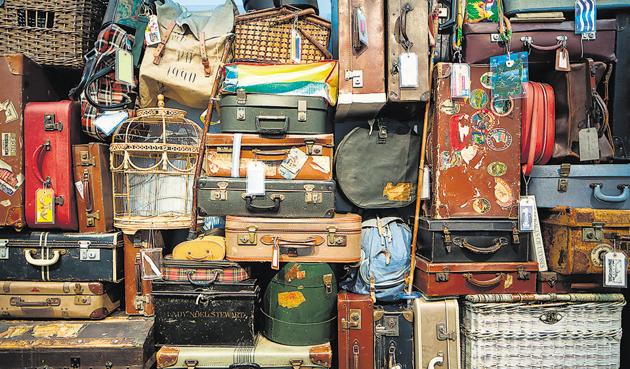The Way We Were: A long-gone author’s timely tips for life on the road
Mohan Rakesh didn’t book tickets in advance and make hotel reservations. He went where the road led, and kept going.
The lockdown is over. But our lives still seem bizarre and unreal in so many ways. For one, when will we be able to travel again, the way we did? Let me re-phrase that: when will we go on holiday again, with our pre-booked tickets, hotel/Airbnb reservations, sight-seeing itineraries and eating-out plans? Because that’s how most of us travel. I wonder though – is that the only way? Of late, I have been reading a lot of the wonderful Hindi writer Mohan Rakesh (books by him and on him) and I’ve been struck by how much and how differently he travelled. For Rakesh, travelling had nothing to do with being on holiday.

He was a peripatetic in the true sense of the word. He was 22 at the time of Partition, when he left Lahore, and in the years that followed, he moved from city to city for work: Jodhpur, Bombay, Jullundur, Shimla. Though he eventually settled in Delhi, he continued to travel incessantly, to Dalhousie and Dharamshala, Kufri, Allahabad, Calcutta, Kashmir (I may have missed out some places). Fellow writer Rajendra Yadav called him a “really restless soul,” saying that often, when a group of friends would be sitting around in the coffee house chatting and gossiping, Rakesh would suddenly decide to take off for Shimla or Gulmarg the next day. He was not exactly rolling in money (far from it), but that never held him back.
Rakesh had a special love for the hills and they were often silent witnesses to momentous events in his own life. It was in the mountains of Kashmir that he first met Kamleshwar, the well-known Hindi writer, in 1955, a meeting that would mark the beginning of a close, lifelong friendship. In his memoir, Jo Maine Jiya, Kamleshwar writes that, on the same trip, Rakesh and his first wife decided to terminate their relationship, while on a horse ride from Pahalgam to Chandanwadi. Rakesh also worked for two years as a schoolmaster in a Shimla boarding school.
It’s hardly surprising then that much of his fiction is set in hill stations and mountains. His 1968 novel, Na Aanewala Kal, is about a schoolmaster in a missionary school in the hills. Many of his short stories – such as Doraha, Ek Aur Zindagi, Gunjhal, Miss Pal – are set in Shimla, Kashmir or Kullu. Characters grapple with fragile relationships, loneliness or just life in capital letters as they go for solitary walks on misty mountain paths, stay in quiet rest houses, or travel in buses that lurch along winding roads. There are some intensely-observed descriptions of landscape and mood – blue skies dotted with scudding clouds of different shapes, skies that can suddenly turn grey and overcast, the cold drizzly rain, the changing colours of snow and grass, the little hotels and clubs with their card rooms and bars.
The magic of the mountains slowly crept into his very soul. In an essay, Gulmarg Ki Khidki Se Ek Raat, Rakesh wrote that when he first went to the famous tourist spot in Kashmir, he thought – what is so unusual about this place? A big open meadow, clusters of deodar trees, that was it! “I saw all of Gulmarg in one hour,” he wrote. But when he began visiting the place regularly, sometimes spending months on end there, he realised he would never be able to “see” all of it. He felt he had become part of the place, along with the mountain slopes gleaming with snow, the drifting clouds, and the yellow sunshine. “When I left Gulmarg, I felt as if I was parting from myself.”
This was what travel was all about for Rakesh. He was also clear as to what it was not about. In a must-read essay, Yatra Ka Romance, he gives two examples – examples which made him laugh uproariously – of ways in which no one should ever travel.
Exhibit A: Rakesh recalls standing in front of the huge expanse of Wular lake in Kashmir, the early morning rays of the sun turning its surface to a shimmering silver. On this lake glides a shikara and in the shikara is an irritated, hassled man. He’s lost his pipe and is looking for it everywhere, under the cushions, in his pockets, asking everyone, ‘Have you seen my pipe? It must have dropped somewhere. It was brand new, I just bought it ten days ago…’ The entire shikara ride on the magnificent lake is spent looking for a pipe.
Exhibit B: Rakesh is at Krishna Sagar Lake in Mysore. He meets a man who is on a three-week trip for a full Bharat darshan. He’s carrying a camera, binoculars, travel guides. He has booked all his flights in advance. He’s carrying a wad of airmail envelopes and sheets of paper on which to write letters. He has a diary for taking notes. That particular day, he has come back to the hotel after visiting several places, from a sandalwood oil factory to Lalitha Mahal. He takes out his diary to write but suddenly can’t recollect the names of any of the places he visited.
But perhaps it was Rakesh who was the strange one. As Rajendra Yadav said of him -- he longed to run away from wherever he was at any point in time, whether it was a place, a job, love or marriage. This inability to be tied down spurred his ceaseless wanderings. What was he looking for? Maybe nothing. In his own words:
“Where does this road go?” asks the traveller.
“Where do you want to go?” is the reply.
“Wherever this road will take me.”
Rakesh walked down the last road of his life too soon. He died in 1972 at the age of 46, leaving behind countless unfinished journeys.





